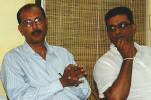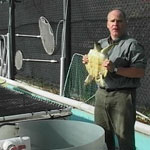The Thumb Print’s series on Media and Northeast India, had its third edition on the June 6. The third “Conversation” in the series was held at Guwahati, in collaboration with, and in the picturesque offices of the Foundation for Social Transformation, housed in a heritage wooden bungalow in Uzanbazar. The meet was well attended by people from varied walks of life, across a spectrum of age groups and professions. This ensured that a multiplicity of divergent views were aired, discussed, and debated.
The basis from which the conversation took off was the often-expressed view that this region is stereotyped in the “outside” media. The handle “Northeast” is often used unthinkingly, as though the region is a monolithic structure, and as though indeed the eight states of the region can be categorised in this manner. If it is not portrayed as a place of conflict and disaster, it is exoticised as the land of “strange” people and stranger customs. Was this true? Or had things changed?
As a moderator it was an invigorating experience steering the conversation. I requested veteran journalist Samudragupta Kashyap of the Indian Express to open the conversation. He was of the view that at least in his paper, there was enough scope to give news of many other happenings, and about interesting people, than of the stereotypes of violence and conflict. He illustrated this from examples given by his own work, for example, his story on Mizo literateur James Dokhuma, with his inspirational life story. These writings of his had always been placed prominently in his paper, and he had had no problems with editorial desks. He implied that it was up to the journalists to find these stories, and place them. There would certainly be a readership for it, if it was well presented.
Robin Barthakur, columnist and tea executive, felt that this region was focused on for the wrong reasons. He spoke of several instances in the past where journalists had filed reports without any basis, and where there was biased reporting. He spoke of the papers of the past that had their own slant on events of this region. There was also the fact of “parachute journalism” where “outside” journalists come in and file stories without much knowledge of the ground realities of the area.
Rajashri Dasgupta, a senior journalist from Kolkata spoke of how a journal’s editorial policy counted for a lot when it came to the kind of coverage that various regions, and subjects, were given. Kula Saikia, writer and police officer, had a different take on the whole issue. He asked if we, as a region and a State, required “special treatment” at all. He was of the view that this asking for special treatment was a move towards ghettoization. If events and personalities here are under-reported, it may be, in fact that there are few such things worth reporting about at the national level, either people or positive events.
Gaurangi Maitra felt that there was a power equation at play here, while Samrat Deka, as an entrepreneur, made the point that as in much else in life, it is demand that feeds supply. Since there is a demand for the kind of news that is disseminated, it is supplied by the media. Ruchira Neog, another social activist had a different take on the whole thing, when she said that there is a “glorifying” of violence in the way it is presented in the media. Photographer Shyamal Datta made a totally different point when he gave the examples of Al Jazeera and the FM Radio station, Amy Goodman’s Democracy Now. If they could overcome all kinds of problems to achieve the cult status that they have, it proved that quality reporting always had value, and an audience. Geeta Seshu, Consulting Editor, The Hoot spoke next of what Big Media considers the mantra for selling…the three S’s…Sex, Sensationalism and Sports in the West. She also lauded Kashyap’s writings in the Express, through which she had learned many things about this region.
According to Arman Ali, a disabled rights activist, the problems with the media arose because they have stopped learning. Speaking from his own experiences, he said that journalists tended to slot, into convenient and pre-conceived mental cubbyholes, without going into the nuances of the story before them. Sriparna B Baruah of the Indian Institute of Entrepreneurship, spoke of her experiences in Manipur, where she felt uncomfortable questions are not asked, and on the other hand, laudable works are not focused upon. Ratna Mala, Assistant Professor, Department of Mass Communication, Mizoram University spoke about how newspapers such as The Hindu ignore stories in their own backyards. Citing the instance of ignoring issues relating to Dalits in Tamil Nadu, she gave examples to prove her point about the invisibility of issues deemed “less important” by the media.
The meet was enlivened by the presence of several students of journalism from Mizoram University. On being asked why they had chosen this profession, they said that it was because it was a “different” career option. One of them had the grouse that in spite of graduating in Journalism, media houses never approached them. In fact it was the other way round…it was they who had to approach the media houses for jobs.
All in all, it was an evening during which a variety of opinions was heard. The discussions had passion and energy, a pointer to the fact that the participants felt deeply about this issue. Most of them wanted to bring in additional points, but paucity of time did not allow this. It is true that several important issues were not touched upon, again undoubtedly due to a time crunch. A sure indication that there is a requirement for Conversations: Guwahati: 2.0 sometime in the not too distant future!







































